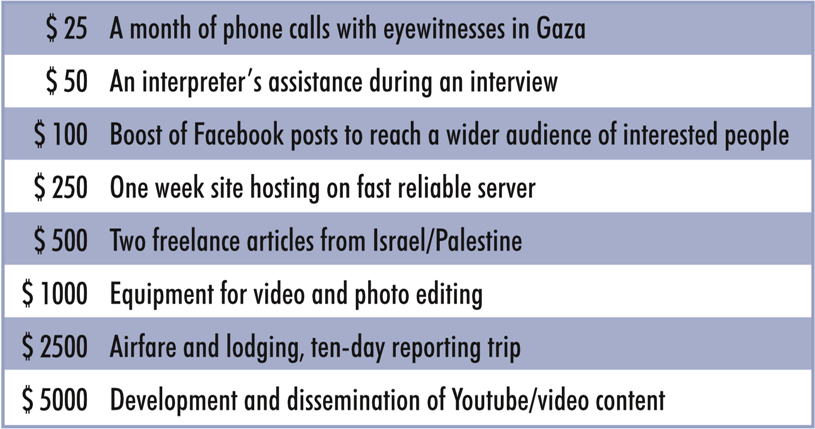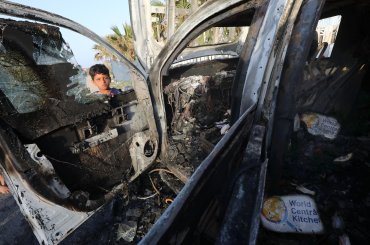Great news! Thanks to a surge in giving, we are nearing our goal in the “Be The Mondoweiss Megaphone” fundraising campaign! Hundreds of readers have committed more than $45,000 so far, which means that all we need now is for you to click through and join them!
Your support enables in-depth reporting on the fight for Palestinian rights—on the ground, in the U.S., and around the world. Give today, so that Mondoweiss can continue exposing what most media prefer to ignore.
Here are some of the ways your donations make a difference:

Below is another response to our request for readers’ stories of their mental journey. Pam Bailey is a freelance writer based in Washington, DC, who also works as special assistant to the chairman of Euro-Mid Observer for Human Rights and international director of We Are Not Numbers. Please join Pam in sharing your story with us at submissions@mondoweiss.net.
If you, like Pam, believe that the voices in Mondoweiss make a difference for justice in Palestine, please contribute today to continue and expand the work you value. Your gift is essential to meet the urgent need for an increase in effectiveness to serve freedom in Palestine and wise U.S. foreign policy.
Click here to see how dollars and cents are transformed into truth-telling. Please give whatever you can, and tell others who value good journalism why you choose to support this work.
Since I was a child, I have had a strong wanderlust and curiosity about other countries. When combined with my desire to be a journalist, kindled in high school by an English teacher, it blossomed into passionate interest in foreign policy.
My human rights focus comes from my parents, religiously conservative when I was young but progressive where it counts. My earliest memories include bringing cookies to the first black family to move into the neighborhood, going to Jesse Jackson’s Operation Push headquarters and debating the death penalty over dinner.
At some point, my critical reading of the news overtook my teenaged love for the romance in the Zionist narrative “Exodus.” I came to recognize that when it comes to the question of “who is the underdog?”, it is the Palestinians, not the Jews in Israel, who are struggling against an oppressive giant’s foot on their necks. This, I think, is the dividing line between Westerners who favor Israel and those who sympathize with the Palestinians. As hard as it is to understand, there are many who view the Jews in Israel as living in fear, oppressed by a mass of Arabs united against them.
The last piece to the puzzle is the fact that despite my progressive leanings and strong affinity for issues of social justice, I took a long detour into the “dark side,” leaving journalism and ending up working for corporate behemoths such as Monsanto and Johnson & Johnson. I don’t mean I worked in the rank-and-file. I was a global vice president. And soon the cognitive dissonance erupted into an identity crisis.
I made my first trip to the West Bank in April 2007, returned in the fall of 2008 and traveled to Gaza on a life-changing journey in March of 2009. It was as much to rediscover my real self as it was for any loftier goal. In the West Bank, and then in Gaza, I was met by such a welcoming culture that my confused self was immediately drawn in. There was an audible “click.” It was like I finally belonged somewhere.
By the end of 2009 I left the corporate world behind, and my marriage, and made Gaza my home for a while. By the way, I think this is a very common syndrome—going to disaster zones or other areas perceived as dangerous because you’re running away from something else. No wonder then that one of the first questions Gazans often ask visitors is, “Why are you here?”
I found myself again. Along the way, I developed a deep love and respect for Palestinians as a culture and a people. Although I now have returned to the U.S., I am devoting much of my life to doing my small part to alleviate the great injustice that has been wrought against them—in large part due to actions of my country’s government. In addition to general activism, I have founded a project called We Are Not Numbers, which I hope will both elevate the voices of Palestinians as well as educate the Western World.
Meanwhile, even in my paying job at a community-development nonprofit, I have found myself connecting the dots between local and international issues as I never had before. When colleagues talk about the need for marketing to “re-brand” a community, to play up its assets instead of crime or foreclosed homes, I find myself thinking, “That’s what Gaza needs!” Gaza has food I miss, a gorgeous sea, talented artists and hospitality you truly won’t find anywhere else. Yet most of the world thinks of rockets and terrorists. If the international community would force Israel and Egypt to end the blockade, oh what an attraction Gaza would be.
I often talk to Gazans about living in a society where large international NGOs run their very lives without asking the people themselves how the money should be spent and what services they most want. I deeply appreciate that the nonprofit for which I work requires the boards of each of its 250 local organizations to be made up of at least one-third local residents. The real experts are the ones who live what they need and what works every day.
And when the city of Baltimore, so close to where I live, erupted in protest and even violence when Freddie Gray died in police custody, I thought of Palestinians. They relate at a visceral level to U.S. blacks and Native Americans. #OneStruggle.
To some, Palestine is an intractable, messy quagmire that can never be resolved and thus is an issue to be avoided. To others, it is a divisive issue that causes friends and colleagues to argue, and thus is not a topic for polite conversation. And then there are those who don’t understand why anyone would get involved if you’re not Jewish, Muslim or Palestinian—if you don’t have “a dog in that fight.”
To me, though, it’s not an issue of race, ethnicity or religion. It is a matter of basic human rights. Isn’t that worth fighting for? Palestine inspires in me the will to fight for what we all deserve.



Thank you for sharing your journey.
Pam Bailey~ you said it straight from your heart into mine. I’ll not rest until the Palestinians are free in their land, with all of the respect that they are entitled to as human beings.
Pam Bailey….
Many heartfelt thanks for your sensitive , thoughtful sentiments towards the tragedy of Palestine and of its people !
Beautiful article !
A step toward justice for Palestinians is indeed a step toward justice for all.
thanks so much pam and it’s always been a pleasure knowing you . i greatly admire your dedication and all the excellent work you do. i still owe you for taking those books to rawan for us! and the ‘we are not numbers’ project is fantastic — i was just tweeting another one yesterday, that then got picked up in somebody’s online magazine.
i totally agree with you “It is a matter of basic human rights” ! keep up the good work ;) in solidarity.
Hey, Pam, yes there is parallels with the history of civil rights movement and the legacy of the Palestinian non-violent, popular resistance. In 2012 when I taught a class at Al Azhar University in Gaza, I constructed a survey my results were that there was a strong identification of Palestinians with the dispossession of American Indians and the boycott movements of African Americans, starting with the streetcar boycotts post-construction era. I also have testimonies from my students and taught for 3 years during spring semesters at the same university and lectured at others. Gaza is my home too more than my ancestral home of Lebanon.
We all love Gaza, I used to go there for 3 months for four years at a time, but have not been able to visit Gaza lately to my mother’s death in 2014, settling her and my father’s estate and a new illness.
My journey started from birth as being of Lebanese heritage, I was always aware of the plight of the Palestinians, and my father’s first cousin, Souheil Chammas (SH in French transliteration becomes “CH–Lebanon colonized by the French) worked for the UN on behalf of Lebanon, the Arab Israeli War and ambassador to Iraq, Germany and Greece. He led the Arab League on behalf of Lebanon at the 1991 Madrid Talks when Israel occupied Lebanon for 20 years (which in other years they did also prior) and joined with Haidar Abdel Shafi, a revered hero in most Palestinians’ eyes honored with a square in his name in Gaza City, and what an ordeal that they had to endure dealing with the U.S. Ambassador to Israel, then Martin Indyck. Here is a link to the conversation where my father’s first cousin stated that all Israel wanted was a “hegemonistic peace”. http://www.ajcarchives.org/AJC_DATA/Files/1995_12_Israel.pdf
http://www.mfa.gov.il/mfa/foreignpolicy/peace/mfadocuments/pages/news%20conference%20arab%20delegation%20representatives%20-.aspx
Granted my cousin was not a revolutionary he was an ambassador but put into perspective in 1992 he articulated Israel’s warped concept of security for why they went to war against their neighbors.
This same injustice my father taught me also persuaded me to be involved at age 15 in the Cesar Chavez grape boycott when our 10th grade class drove down to Delano and delivered toys to the farm workers, Hispanics and Filipinos (even Yemenis) and had a sleep over on the floor at the Asbestos Worker Union headquarters . I still have in my closet a “grape boycott” tee shirt from 1968, bearing the words “Union Label Grapes”. Having our family business in Downtown Los Angeles, we were at the center of the 1964 riots, my father was involved in African American and Mexican American Politics and helped launch MAPA (Mexican American Political Association). So you can say activism was inbred into me at an early age. Moving to Newport Beach at age 12 was a cultural shock living in an urban environment, for my political positions on a variety of topics, Vietnam War, Palestinians, gay rights, etc. I was often ostracized until this day it is hard for me to get a regular professorial position although I get published in usually UK-USA sociological journals as educational journals do not publish my academic work, quantitative and qualitative as I challenge the status quo backed by empirical evidence—yet education journals complain that there is not enough articles written on Arab and Muslim students in education. My newest publication is in Journal of Mixed Methods Research. My last words, which I am sure Pam would agree, when we leave this earth we want to think we contributed to the preservation of human rights, albeit our goals were not deemed as popular by the status quo.